An explosive insider memo warned of ‘wishful thinking’ on the imminent climate risks to the supply chain. Can its publication shake up a complacent industry?
The food industry is heading for a supply chain catastrophe that will overshadow the pandemic. So said a bombshell memo – as revealed by The Grocer in April – warning of the all too imminent impact of the climate crisis.
We have “reached a moment of threat to food security like none other we have seen”, it argued, putting the UK on course for inevitable food shortages.
It was not so much the content that made the memo stand out, but the source. This warning didn’t come from campaigners like WWF or Greenpeace, which have long been sounding the alarm bells on climate. It hadn’t even come from a parliamentary appointed group like the Climate Change Committee, which last month found the government had failed to take the action needed to protect the UK from the multiple threats of an environmental disaster.
Instead, these accusations came from whistleblowers inside the industry. The Grocer has verified the legitimacy of the executives taking part in the campaign, and here, for the first time, they expand on the warnings laid out in the explosive memo.
“Us taking a stand is based on wanting to help rather than as an act of mischief or sabotage”
They tell all on the group’s early meetings, the difficulty of getting climate on the agenda, the relationships between retailers and their supply chains and much more.
The whistleblowers were a group called Inside Track x Food, made up of about 20 executives who hold or have held senior roles at major UK food manufacturers, retailers and associated businesses.
Its memo (below) warned food businesses were woefully unprepared for challenges including soil degradation, extreme weather events, global heating and water scarcity – and that yield, quality and predictability of food supply were all at severe risk.
What’s in the whistleblowers’ memo?
Predictions:
- The memo cites scientific research predicting increases in drought and flooding, extreme heat and extreme weather events and depletion in soil health in the established growing regions most critical to UK food supply.
- Key sourcing regions will suffer decreased capacity from loss of predictability, yield and quality.
- UK retailers will face empty shelves. Supplies will run dry from food companies that are reliant on single crops from regions under threat.
Who or what’s to blame?
- Companies whose sourcing strategies are based on “wishful thinking”. They are increasingly alluding to a strategy of simply finding new sourcing regions and are offering little in the way of robust plans for investing in supply chains.
- The memo claims manufacturers, producers and retailers are able to defend their strategies because they are looking at their data in isolation.
- Insufficient consideration is being given to ‘long term’ issues. Rather, long-term planning is too often kept as a separate, technical compliance process and not integrated into strategy.
- Decision-making is being driven by fear, with the competitive nature of UK food companies limiting ‘real’ conversations connected to the threats.
- The stringent nature of the grocers’ code of conduct, combined with competition law and a highly competitive sector, means the industry is often unwilling or unable to pool insights and come up with joint strategies.
- While there are plenty of industry working groups and conferences, they’re often dragged into the superficial rather than the fundamental.
Solutions:
- An open conversation among the industry about the scale of change, and an understanding of the economic value of that change over the medium term.
- Longer-term investment in improving drought and flood resistance, soil health and climate resilience in communities from which we source, as well as supporting action on dietary shifts. Plus, a Covid-level government war room of food industry leaders (including farmers and growers) to take collective action on these issues.
- Industry needs Covid-style support from government and mandating of action to provide a level playing field.
- Auditors need to be upskilled and demand more from food, with a drastic increase in executive and board-level focus on resilience.
In publicising it concerns, the group hoped to spur food industry companies, directors, owners, investors and creditors into action.
Resilience planning, the group claims, is all too often based on “wishful thinking” and “false reassurances”. Food companies are not only failing to take the action needed to safeguard their companies, but also pulling the wool over the eyes of investors, it argues.
The controversial nature of those allegations mean whistleblowers in the group have asked for their names to be changed. But these are names that would normally carry weight. ‘Paul’, for example, is a senior executive at a major food manufacturer.
“I got introduced to the group last year through a common contact,” he says. “They explained they were looking at getting this together and asked if I’d be interested.
“I’ve seen how this subject is not getting the traction it needs in the boardroom. I’ve seen how little things are progressing.” Joining the group “felt like an opportunity to try to galvanise action in a way that’s powerful and can hopefully move the dial”, he says.
As a starting point, the group held confidential meetings both in person and online. Its first major decision was to decide exactly what it should be calling for.
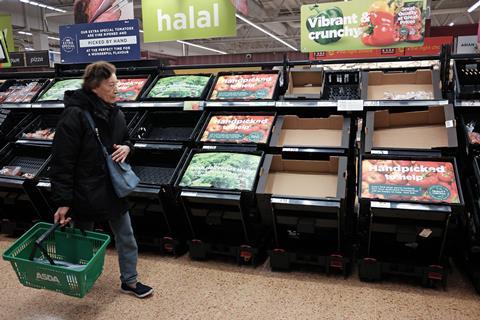
“We thought very hard about the topic for the memo,” says Paul. “We wondered whether we should be doing something aimed at the government, but that didn’t feel [like] the right approach this time. In the end, the topic we chose was disclosure, and we hope that’s where the memo can really strike home.”
The group claims major food companies have filled their climate risk reports with casual mentions of threats to supply chains over the short to medium term. However, the strategies to mitigate these risks are in reality “subscale and insufficient”, it argues.
“If we don’t face up to this threat my company’s not going to be here in the 30 years, because we won’t have a supply chain”
The reports include “proclamations about transitioning to different products or ingredients – which exist as paper plans but are not being invested in to deliver the scale of change required”. There are also passing mentions of “moving to other sourcing regions that simply have not been stress-tested or worked through well enough to be considered viable”.
“I’m sat here as a father of two kids thinking that in their lifetime there’s going to be a climate shock that means we cannot get the key ingredients we need,” Paul continues. “And we’re just sleepwalking into this disastrous scenario.”
Read more:
-
Beyond Unilever: Alan Jope on soap, slavery, and the supply chain
-
Can Tesco resurrect interest in scaled-up refill & reuse?
-
Refill Coalition: why didn’t it achieve its reuse vision?
Paul acknowledges some mechanisms do exist – such as the Task Force on Climate-Related Financial Disclosures (TCFD), which aims to provide a framework for investors. However, he feels they “don’t have any teeth” and have become a “tick-box exercise” used as an excuse for inaction.
“I want my company to be sustainable and continue to thrive over the next 30 years, but if we don’t face up to this threat, we’re not going to be here in 30 years because we won’t have a supply chain,” he adds.
“If we don’t get key ingredients, we just can’t make the products that historically we would have, and the availability of those raw materials used is becoming more and more challenging. We’ve been able to move things around to different suppliers and maybe different countries in the past, but there will come a point when you can’t do that any more.”
Failure to act
Paul points out that even recent climate-related shortages have failed to galvanise the industry and its backers into action.
“The reason we decided to focus on the investment piece is because the business risk is not being given anything like the elevation it should be,” he says. “That’s the bit that worries me. As an industry and as investors, we’re just blissfully unaware of the risks that are out there because supply chains have historically just absorbed them.
“Yes, there will be price increases, but we’ve had to absorb them. That’s not going to be possible forever because those freak weather events are becoming more and more frequent, whether due to extreme flooding or heat,” he adds. “The floods in Malaysia were a really good example last year. Citrus fruit was just wiped out. In that same region in 2023, we had droughts – the system just can’t cope with such intense weather activity.”
The memo claims the competitive nature of UK food companies – and their fear of having “real conversations” – has led to senior teams and boards giving insufficient consideration to long-term issues. They are trying to please rather than be honest with directors, shareholders, owners and creditors, it says.
Spain’s salad shortage pain
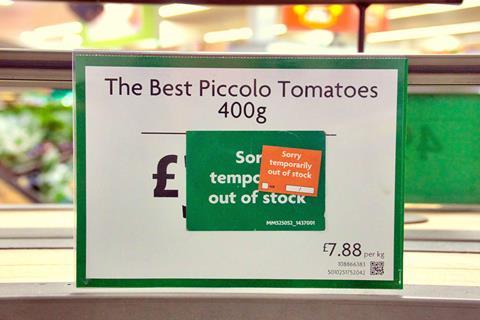
In February 2023, supermarkets had vast empty spaces that would normally be filled by citrus fruits and salad crops such as tomatoes, cucumbers, peppers and lettuces. The supply chain was blitzed by unusually cold weather in southern Spain and Morocco, which provide a huge slice of UK fresh produce in winter. Murcia in Spain alone produces an estimated 80% of many salad and vegetable crops sold in the UK at that time of year.
So the advent of floods and storms in the region – bad enough for ferries to be delayed or cancelled – took its toll. At one point, Morocco barred exports of tomatoes, onions and potatoes to west African countries as it tried to protect exports to Europe. The shortages led to Covid-style rationing across major retailers.
Meanwhile, the group claims companies feel less pressure from government to act, despite supply chain issues getting worse. That’s exemplified by the government scaling back its own climate ambitions and the likes of former PM Tony Blair criticising current net zero policies as “doomed to failure”.
“It’s not something that from a regulatory point of view there’s any pressure on,” says Paul. “Our customers, the retailers, aren’t asking those questions. I don’t have them coming to me and saying: ‘Show me your resilience plans for the main commodities you use.’ When I’ve raised it in our boardroom and with senior leaders, it’s been very difficult to get any traction, because if it’s not pounds and pence now, they’re not interested.
“I’ve found this same message resonates with everyone in our group. And it will continue to get worse. We’re unlikely to hit the climate strategies we’ve set, we’re unlikely to hit biodiversity targets, or water targets,” he warns.
“The US doesn’t even recognise climate change any more, and China is still pumping out gases into the atmosphere at a scary rate. The food system is genuinely at risk of collapse – it could be next year, it could be in 20 years’ time, but the science backs that up.”
Big businesses confronted
The memo claims the industry has reached a moment of threat to food security “like none other we have seen”. And thanks to the whistleblowers, its claims are now being put to the boards of major food companies in the UK.
Last month, for example, Unilever’s AGM was targeted by ShareAction, a group that’s become an effective thorn in the side of food companies with its campaign for greater health commitments. ShareAction asked Unilever how it felt about the memo, whether its staff were raising such issues internally and if they would be “rewarded or punished” for doing so.
“With senior leaders it’s been very difficult to get any traction, because if it’s not pounds and pence, they’re not interested”
Unilever declined to comment when asked by The Grocer, but ShareAction says the company had expressed “willingness to engage”.
Unilever CEO Fernando Fernandez acknowledged challenges with supply reliability, quality and yield for cocoa, in particular, when faced with the challenge at the AGM. However, he added that cocoa and sugar were commodities primarily relevant to the ice cream division, which he wants to demerge from the company this year.
Other AGMs, including those of Tesco, Sainsbury’s, Hilton Food Group and Associated British Foods, are also being targeted by ShareAction.
Cocoa shortages hit supplies
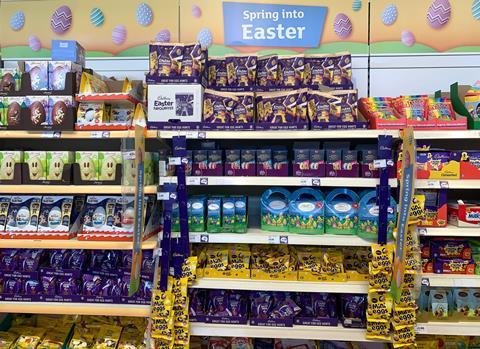
This year, the prices of Easter eggs and chocolate bunnies shot up by as much as 50% in the mults following a shortage of cocoa from west Africa.
Of the 281 lines that were available this year and last across the traditional big four supermarkets, 258 (91.8%) had risen in price [Assosia 11 March 2024 vs 31 March 2025].
A steep fall in global cocoa production driven by unusually warm weather was blamed for the jump in prices. In February, a number of well-known chocolate brands had already resorted to shrinking their products due to the climate-related cocoa shortage. Mondelez and Mars Wrigley were among those shrinking pack sizes to mitigate soaring input costs.
The memo could well have repercussions outside those meetings. Investor reaction will be crucial, says Rachel Crossley, head of stewardship, Europe, at BNP Paribas Asset Management. Thanks to the “heroism” of the whistleblowers, they have now been woken up to the business risks, she says.
“This moment is very significant,” Crossley tells The Grocer. “I think investors should take it extremely seriously. For professionals working for businesses that account for more than half of UK grocery sales to be concerned enough to come together, and potentially put their careers in jeopardy, is extraordinary.
“That should be reason enough for investors to pay close attention to the points they’re raising. I very much hope it’ll galvanise greater engagement from shareholders with food companies.
“There are several investor initiatives that focus on addressing various dimensions of the food system, and I see an increasing number of investors developing an understanding of how serious the sustainability impacts of this sector are, and that companies’ responses are not sufficient.
“I intend to raise awareness of this memo among those I take part in and discuss with other investors how we might use the insights in it to deepen our engagement with companies. I also plan to explore whether a new investor group could be set up specifically to address the concerns laid out in the memo.”
Read more:
-
Can B Corp’s updated standards address credibility concerns?
-
How the role of the supermarket buyer is changing
-
How ‘agri-AI’ technology is changing farming
Another member of the group potentially putting his career at risk is ‘Malcolm’, a senior supermarket executive with many years of experience. He believes the food industry needs to adopt the spirit of collaboration seen during the pandemic if it’s to avoid a climate catastrophe.
“When the pandemic happened, the industry came together with its war room and showed it was prepared to work together to take action to face the threat,” he tells The Grocer. “We’re now asking our industry to show the same attitude to respond to the threat of climate change.
“I believe the leaders in our various businesses all want to do the right things, but we have this huge issue of how we raise the inconvenient truths of climate change against a challenging financial backdrop that means their attention is focused elsewhere,” he adds.
Malcolm believes more people working in the industry share the group’s fears. “We’re professionals, not campaigners or NGOs. We’re businesspeople who desperately want our companies to succeed,” he says.
“I believe we’re just the tip of the iceberg [in feeling] there’s a lack of will, or there has been to date anyway, from the people leading our companies. Us taking a stand is based on wanting to help, rather than an act of mischief or sabotage.”
Storms and flooding at home and abroad
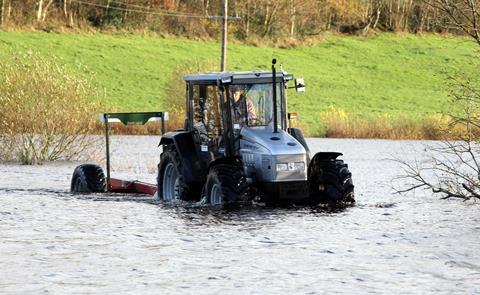
Apocalyptic flooding in Valencia last year not only left 140 people reported dead, it also submerged thousands of hectares of farmland.
Warnings soon emerged of a major impact on citrus exports.
Closer to home, a Met Office report revealed 2023 was the second-warmest year since records began in 1884, bringing with it record levels of rain in the UK. Furthermore, in January, hundreds of supermarkets were forced to shut as Storm Éowyn ravaged large parts of the UK, in what has been described as the storm of the century.
Tesco, Sainsbury’s, Asda and Morrisons all closed their stores across swathes of Scotland and Northern Ireland, with thousands of home deliveries and click & collect appointments also cancelled. Scientists have warned such extreme climate events will become more common.
Delisting fears
Until now, Malcolm says, the relationship between retailers like his and suppliers has been characterised by fear of delisting. That makes it tough to talk about environmental fears and possible scarcity of commodities.
“Even when suppliers find problems, they’re nervous to go to retailers like us,” he admits. “They’re worried they’re going to lose their contracts.”
Testimonies such as this should be a concern for non-profit organisations like Wrap, which claims a central part of its mission is to “future proof” the food system.
Like Unilever, Wrap also refused to comment directly on the content of the memo. However, Estelle Herszenhorn, its head of food system transformation, says: “Wrap and the members of the UK Food & Drink Pact are very aware of the need for urgent action, at scale, to transform our broken food system. We’re working at pace to mitigate against the huge climate and resilience challenges we face by tackling GHG emissions, water stewardship and food loss and waste.”
Olive oil becomes ‘liquid gold’
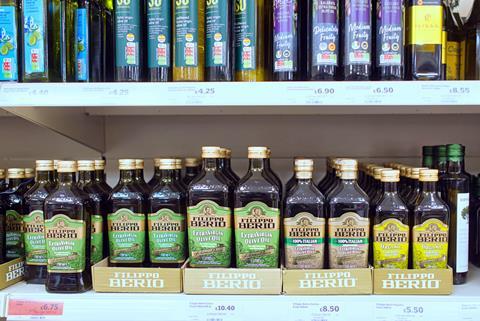
In 2023, the average price per litre of branded oils rocketed 30.8%. And volumes fell 8.9% [NIQ 52 w/e 9 September 2023]. Both data points were explained by long-lasting droughts in olive-growing regions, which took a severe toll on production.
The key ingredient in the Mediterranean diet risked becoming a luxury few could afford, and was even dubbed “liquid gold” at one point. Security tags on olive oil became a shock feature of the UK supermarket shelves when supplies from Spain nosedived and prices skyrocketed.
A return to more rainfall and milder weather in 2024 meant suppliers were able to reduce their wholesale prices, allowing retailers to bring base prices down and feature more and deeper promotions.
Wrap says it’s using its technical expertise, evidence base and power to convince food & drink businesses and citizens to take the right actions.
IGD also refused to comment on the memo despite calling climate change the “greatest long-term risk” to the industry in a March report. In that work, it said more frequent and extreme weather events were “certain to challenge the entire food system”.
Meanwhile, the government’s Food Strategy has named the UK’s food security as one of its key aims. It will look to “build resilience in the face of climate shocks and geopolitical changes”, and strengthen the supply chain that keeps the nation fed.
“We’re working at pace to mitigate against the huge climate and resilience challenges we face”
Estelle Herszenhorn, Wrap
But that’s no guarantee of action. Earlier this month, one of the food industry’s most legendary figures, Terry Leahy, warned food security should not simply form part of the Food Strategy – rather, it should be a core pillar of the government’s industrial strategy.
As for the memo, the big question is whether – against a backdrop of wars in the Middle East and Ukraine, Trump’s tariffs and the pushback on net zero around the globe – this dramatic appeal for action from the heart of the food industry can truly make a difference.
Can the action by insiders become a catalyst for a major overhaul of resilience planning? Or will it simply get washed over in the relentless flood of other competing food industry and government priorities – at least, until the food runs out?







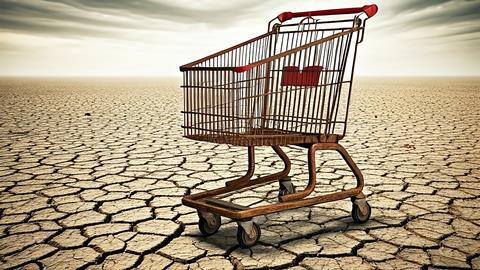
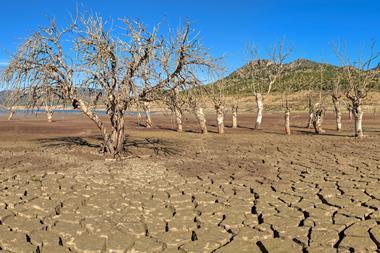











No comments yet